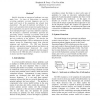Free Online Productivity Tools
i2Speak
i2Symbol
i2OCR
iTex2Img
iWeb2Print
iWeb2Shot
i2Type
iPdf2Split
iPdf2Merge
i2Bopomofo
i2Arabic
i2Style
i2Image
i2PDF
iLatex2Rtf
Sci2ools
139
click to vote
HICSS
2005
IEEE
2005
IEEE
Causal Reasoning Engine: An Explanation-Based Approach to Syndromic Surveillance
1 Quickly detecting an unexpected pathogen can save many lives. In cases of bioterrorism or naturally occurring epidemics, accurate diagnoses may not be made until much of the population has already been jeopardized. The goal of syndromic surveillance is to detect early anomalies that emerge from patient data in a given population area and to note disease patterns before more individuals begin to experience definitive symptoms. We developed a syndromic surveillance approach for generating advance warnings of potential wide-spread diseases as well as identifying demographic attributes that are predictive of the diseases. We describe the Causal Reasoning Engine (CRE), a multipurpose decision support system for diagnosing causes from observed symptoms and predictors. The CRE uses Bayesian inference and machine learning methods and deploys an intuitive explanation-based framework for causal modeling. We also present a diagnostic decision support tool based on the CRE that allows emergency ...
Biometrics | Causal Reasoning Engine | Decision Support | HICSS 2005 | Syndromic Surveillance | System Sciences |
| Added | 24 Jun 2010 |
| Updated | 24 Jun 2010 |
| Type | Conference |
| Year | 2005 |
| Where | HICSS |
| Authors | Benjamin B. Perry, Tim Van Allen |
Comments (0)

